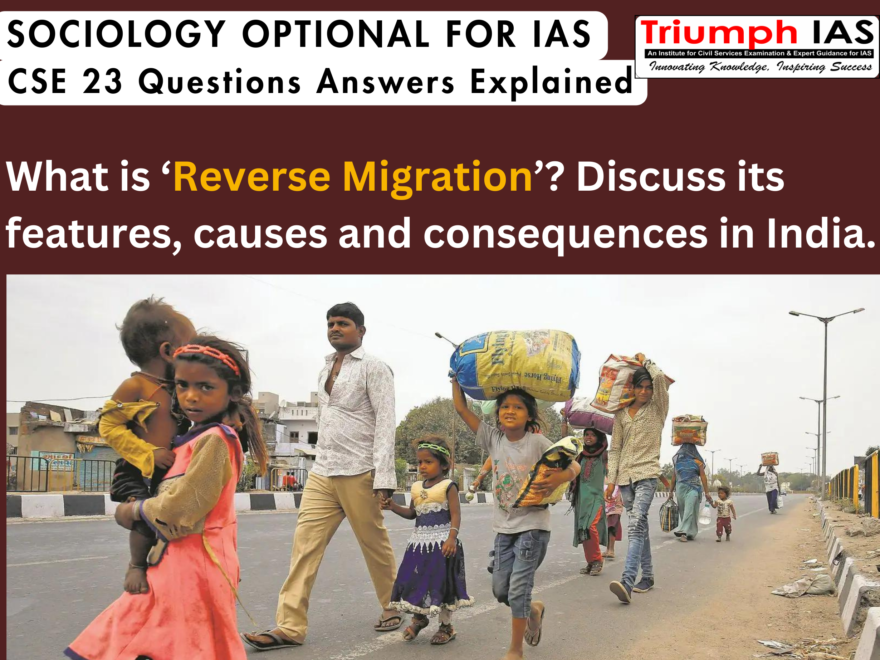What is ‘Reverse Migration’? Discuss its features, causes and consequences in India.
Section: B.
Sociology Paper 2023 Analysis.
Relevant for Paper-2 : Rural and Agrarian transformation in India: migration.
Question- 7 (B): What is ‘Reverse Migration’? Discuss its features, causes and consequences in India. (20 Marks)
|
Introduction: Introduce the concept of migration, and then explain reverse migration in this background. Main Body: Explain features, causes and consequences. Conclusion: On the lines of developing the capacity. |
Introduction
Migration refers to the change in one’s place of residence, whether temporary or permanent, and is a human response to various social, cultural, political, economic, and environmental conditions. Reverse migration, on the other hand, is the movement of people from a place of employment to their native homes, often due to changes in socio-cultural and economic environments. In the Indian context, reverse migration gained significant attention during the COVID-19 pandemic, as it led to large-scale migration of migrant workers back to their villages.
Main Body
Features
- Temporary Nature: Reverse migration is often temporary, with migrants returning to their home regions during periods of economic downturn or crisis and then re-migrating when conditions improve.
- Usually associated with marginalised people: these reverse migrants usually belong to marginalised sections with low skilled or unskilled, usually consisting of underclass with low bargaining power.
- Urban to Rural: In the Indian context, reverse migration often involves movement from urban to rural areas.
- Associated with lesser opportunities in urban areas: This type of reverse migration is also observed in other scenarios such as Push back migration. Ashish Bose in his study found that due to unemployment, marginal employment in urban areas act as a deterrent for rural population to find jobs in urban areas.
- Elite reverse migration : Many successful entrepreneurs and professionals returned from foreign countries to contribute to the growth of the Indian economy and society in the wake of the Global financial crisis of 2008, and the rise of white nationalism in Europe and America.
Causes
- Economic Factors: Economic downturns or lack of job opportunities in host regions can prompt reverse migration. The COVID-19 pandemic, for example, led to widespread job losses, prompting many migrants to return to their home regions.
- Sociological Factors : COVID-19 pandemic revealed the weak financial status of migrant workers, who have no or very little savings and job security. They preferred to return to their villages due to insecurity for life and livelihood, as well as the unsympathetic and unhelpful attitude of the urban middle class where they work.
- Work from Home System: The reach of information technology and the internet in rural areas and tier 2 cities has led to urban dwellers migrating to their villages or towns, which is also a form of reverse migration.
- Political instability and political mobilisation: sometimes political instability and political mobilisation against migrants like son of soil movements causes reverse migration.
- Lack of collective solidarity and sense of anomie: sometimes reverse migration resulted from the lack of belongingness and loss of identity resulting into alienation. Whereby returning to native place leads to collective effervescence and exhilaration.
- Development and opportunities in native area: Positive Rural Transformations and Opportunities in Native Regions: The allure of favourable rural developments has the potential to draw migrants back to their home areas. The implementation of initiatives like the National Rural Employment Guarantee Act (NREGA) in India, which guarantees rural employment, stands out as a key catalyst in this regard.
- Work from home: companies have also given option of Work from home which has also led to migration to native places.
Consequences
- Economic Implications: The reverse migration during the COVID-19 pandemic affected the recovery of economic activity in cities after the lifting of lockdown, as many migrant workers returned to their native villages, affecting the labor force and economic growth.
- Social Implications:
-
- Reverse migration can strengthen family and community ties, as individuals return to their hometowns and reconnect with their roots. This can contribute to social cohesion and community development.
- Returning to their villages, migrant workers faced problems in commuting and quarantine. Some of these workers found jobs in MGNREGA work and some in local industries, while others faced issues in family relations and domestic violence.
- Policy Implications: The condition of migrant workers during the COVID-19 pandemic revealed that workers are inadequately protected by social security measures. Provisions of medical insurance and unemployment or layoff benefits measures need to be universalized.
- Cultural Syncretism: Reverse migrants bring elements of urban culture into rural environments. This infusion of urban influences has resulted in a fusion of urban and rural cultures in villages, particularly evident in states like Bihar and Uttar Pradesh in India.
Conclusion
Reverse migration in India is a complex phenomenon with significant economic, social, and development implications. It requires careful management and policy responses to mitigate its negative impacts and harness its potential benefits. In the post-COVID economy, the Indian government needs to collectively forge strategies to enable the reverse migration of informal migrant workers and smooth their reintegration, focusing on their economic and social well-being.
Related Blogs…
 |
 |

To master these intricacies and fare well in the Sociology Optional Syllabus, aspiring sociologists might benefit from guidance by the Best Sociology Optional Teacher and participation in the Best Sociology Optional Coaching. These avenues provide comprehensive assistance, ensuring a solid understanding of sociology’s diverse methodologies and techniques.
META TAGS:
Taylorism, Scientific Management, Frederick Taylor, Efficiency, Standardization, Specialization, Worker Exploitation, Organizational Hierarchy, Merits and Demerits, Contemporary Organizational Functioning, Sociology Question Paper, Sociology Question Paper 2023, Sociology Question Paper CYQ, Sociology Question Paper UPSC, What is Taylorism? Analyze its merits and demerits.
Why Vikash Ranjan’s Classes for Sociology?
Proper guidance and assistance are required to learn the skill of interlinking current happenings with the conventional topics. VIKASH RANJAN SIR at TRIUMPH IAS guides students according to the Recent Trends of UPSC, making him the Best Sociology Teacher for Sociology Optional UPSC.
At Triumph IAS, the Best Sociology Optional Coaching platform, we not only provide the best study material and applied classes for Sociology for IAS but also conduct regular assignments and class tests to assess candidates’ writing skills and understanding of the subject.
Choose The Best Sociology Optional Teacher for IAS Preparation?
At the beginning of the journey for Civil Services Examination preparation, many students face a pivotal decision – selecting their optional subject. Questions such as “which optional subject is the best?” and “which optional subject is the most scoring?” frequently come to mind. Choosing the right optional subject, like choosing the best sociology optional teacher, is a subjective yet vital step that requires a thoughtful decision based on facts. A misstep in this crucial decision can indeed prove disastrous.
Ever since the exam pattern was revamped in 2013, the UPSC has eliminated the need for a second optional subject. Now, candidates have to choose only one optional subject for the UPSC Mains, which has two papers of 250 marks each. One of the compelling choices for many has been the sociology optional. However, it’s strongly advised to decide on your optional subject for mains well ahead of time to get sufficient time to complete the syllabus. After all, most students score similarly in General Studies Papers; it’s the score in the optional subject & essay that contributes significantly to the final selection.
“A sound strategy does not rely solely on the popular
Opinion of toppers or famous YouTubers cum teachers.”
It requires understanding one’s ability, interest, and the relevance of the subject, not just for the exam but also for life in general. Hence, when selecting the best sociology teacher, one must consider the usefulness of sociology optional coaching in General Studies, Essay, and Personality Test.
The choice of the optional subject should be based on objective criteria, such as the nature, scope, and size of the syllabus, uniformity and stability in the question pattern, relevance of the syllabic content in daily life in society, and the availability of study material and guidance. For example, choosing the best sociology optional coaching can ensure access to top-quality study materials and experienced teachers. Always remember, the approach of the UPSC optional subject differs from your academic studies of subjects. Therefore, before settling for sociology optional, you need to analyze the syllabus, previous years’ pattern, subject requirements (be it ideal, visionary, numerical, conceptual theoretical), and your comfort level with the subject.
This decision marks a critical point in your UPSC – CSE journey, potentially determining your success in a career in IAS/Civil Services. Therefore, it’s crucial to choose wisely, whether it’s the optional subject or the best sociology optional teacher. Always base your decision on accurate facts, and never let your emotional biases guide your choices. After all, the search for the best sociology optional coaching is about finding the perfect fit for your unique academic needs and aspirations.
Follow us :



Find More Blogs…
| Compare and contrast Karl Marx’s and Max weber’s | Karl Marx- Historical Materialism |
| Position of Women In the Modern Indian Society | Sociology: Social system and pattern variables |
KEYWORD: Reverse Migration,Reverse Migration,Reverse Migration,Reverse Migration,Reverse Migration,Reverse Migration,Reverse Migration,Reverse Migration,Reverse Migration,Reverse Migration,Reverse Migration,Reverse Migration,Reverse Migration,Reverse Migration,Reverse Migration,Reverse Migration,Reverse Migration,




